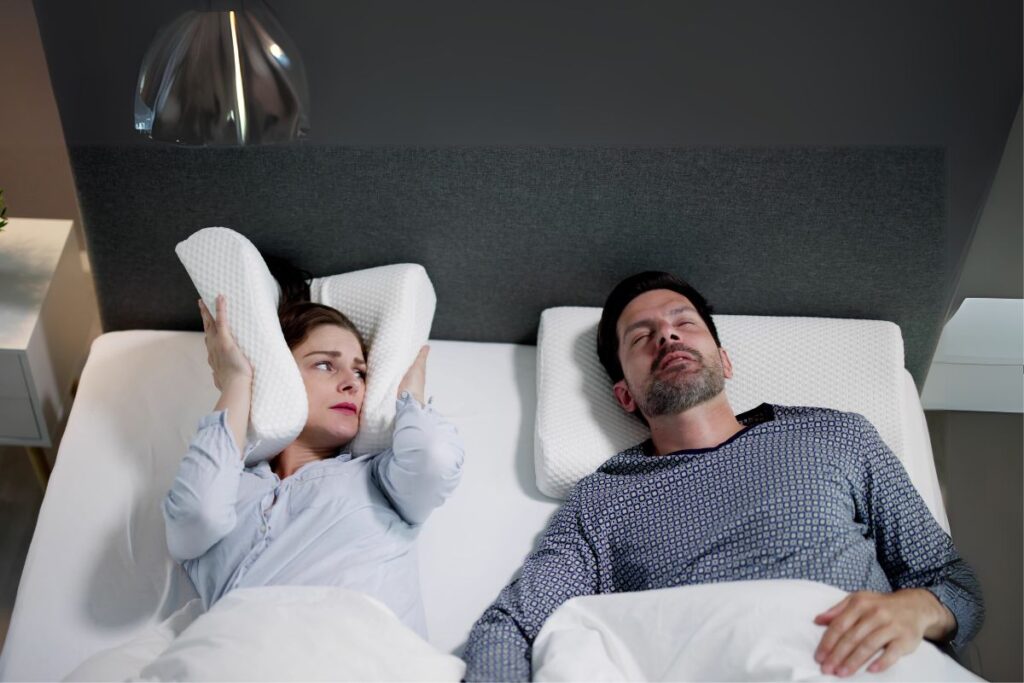Waking up tired despite sleeping all night? Snoring so loudly that it wakes your partner? Sleep apnea might be the reason behind your poor sleep—and your poor health.
What Is Obstructive Sleep Apnea (OSA)?
Obstructive Sleep Apnea (OSA) is when your breathing stops and starts repeatedly during sleep. It happens when your airway becomes blocked due to too much relaxation of the muscles at the back of your throat.
These pauses in breathing can last from a few seconds to a minute and may happen dozens of times an hour, disrupting your sleep cycle and leaving you exhausted.
Signs and Symptoms of OSA
Sleep apnea symptoms often go unnoticed by the person experiencing them but are obvious to their partner. Common signs include:
● Loud, persistent snoring: Often the first noticeable symptom.
● Gasping or choking: Waking up suddenly due to paused breathing.
● Daytime sleepiness: Feeling drowsy or nodding off during the day.
● Morning headaches: a result of low oxygen levels as you sleep.
● Irritability or mood changes: Poor sleep affects mental health.
What Causes OSA?
Your risk of OSA can be increased by a number of factors:
● Obesity: Extra fat around the neck narrows the airway.
● Age: OSA is more common in people over 40.
● Family History: Genetics can play a role.
● Alcohol or Sedative Use: These relax throat muscles excessively.
● Smoking: Increases inflammation and fluid retention in the airway.
● Medical Conditions: Conditions like high blood pressure, diabetes, or hypothyroidism raise the risk.
Why Is Sleep Apnea Dangerous?
OSA isn’t just about snoring—it can have serious health consequences if left untreated:
● Heart Disease: Increases the risk of high blood pressure, heart attacks, and strokes.
● Diabetes: Poor sleep affects blood sugar control.
● Mental Health: Leads to anxiety, depression, and memory problems.
● Accidents: Daytime drowsiness increases the risk of car accidents or workplace injuries.
How Is Sleep Apnea Diagnosed?
If OSA is suspected, your doctor may recommend:
● Sleep Study (Polysomnography): A comprehensive overnight test that monitors breathing, oxygen levels, and sleep stages.
● Home Sleep Test: A simplified test to detect OSA in the comfort of your home.
Treating OSA: Restoring Healthy Sleep
OSA treatment focuses on keeping your airway open during sleep:
1. Lifestyle Changes
● Lose weight if overweight.
● Avoid alcohol and sedatives before bed.
● Sleep on your side rather than your back.
2. Continuous Positive Airway Pressure (CPAP)
● A CPAP machine delivers steady air pressure through a mask to keep your airway open.
3. Oral Appliances
● Custom-fitted devices reposition your jaw and tongue to prevent airway blockage.
4. Surgery
● Procedures like uvulopalatopharyngoplasty (UPPP) or Inspire therapy (nerve stimulation) may help in severe cases.
How HealthPil Can Help:
At HealthPil, we connect you with sleep specialists who can evaluate your symptoms and guide you through testing and treatment for OSA. Our teleconsultations make it easy to start your journey to better sleep.
Myths About Sleep Apnea
1. Myth: Only overweight people get OSA.
Truth: While obesity is a risk factor, OSA can affect anyone.
2. Myth: Snoring always means sleep apnea.
Truth: Not everyone who snores has OSA, but loud, frequent snoring is a red flag.
3. Myth: OSA isn’t a big deal.
Truth: It is a big deal if you don’t get it treated, as it can result in deadly complications.
FAQs About OSA
Can children have sleep apnea?
Yes, it is often caused by enlarged tonsils or adenoids.
Is OSA curable?
Treatment can manage symptoms effectively, but lifestyle changes are essential for long-term improvement.
How do I know if I need a CPAP machine?
Your doctor will recommend CPAP if your sleep study shows moderate to severe OSA.
Can OSA go away with weight loss?
Weight loss can reduce symptoms, but OSA may persist due to other factors.
Disclaimer:
This article is for informational purposes only and does not replace professional medical advice. If you suspect sleep apnea, consult a doctor immediately.

